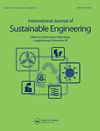Alternatives of municipal solid wastes to energy for sustainable development. The case of Barranquilla (Colombia)
IF 3.6
Q3 GREEN & SUSTAINABLE SCIENCE & TECHNOLOGY
International Journal of Sustainable Engineering
Pub Date : 2021-10-26
DOI:10.1080/19397038.2021.1993378
引用次数: 4
Abstract
ABSTRACT Municipal solid remains an issue that needs to be addressed globally towards a more circular economy and lower environmental impacts. In Colombia, over 96% of municipal solid wastes are landfilled, with little recycling or revalorisation of wastes and several environmental implications. With the technological development of different waste-to-energy routes, the energy revalorisation of solid wastes is increasingly becoming an attractive business opportunity. The waste-to-energy potential of the Atlantic Department (Colombia) was estimated based on the characteristics and daily availability of municipal solid wastes for different technologic routes. The implementation of the technological routes discussed could replace from 1 to 49 % of the demand for energy carriers like natural gas, electricity, or gasoline. This energy potential could replace from 2 to 106% of the energy demanded by the power generation, transport, residential, industrial, and commercial sectors. Furthermore, these technology routes could reduce greenhouse gas emissions by 46 to 92% of the greenhouse gas emissions resulting from landfilling. These results stress the need to upgrade energy policies in the country and to introduce new incentives to overcome economic and other barriers precluding the widespread use of waste-to-energy technologies. Abbreviations: Tuning in to Kids (TIK); Parental Reflective Functioning (PRF) Australian New Zealand Clinical Trials Registry (ANZCTR) number: ACTRN12618000310268利用城市固体废物替代能源促进可持续发展。巴兰基亚(哥伦比亚)案
城市固体仍然是一个需要在全球范围内解决的问题,以实现更循环的经济和更低的环境影响。在哥伦比亚,超过96%的城市固体废物被填埋,几乎没有废物的回收或重新利用,并造成一些环境影响。随着各种废物能源转化途径的技术发展,固体废物的能源转化日益成为一个有吸引力的商机。大西洋部(哥伦比亚)的废物转化为能源的潜力是根据不同技术路线的城市固体废物的特点和每日可用性来估计的。所讨论的技术路线的实施可以取代对天然气、电力或汽油等能源载体的1%至49%的需求。这种能源潜力可以替代发电、运输、住宅、工业和商业部门所需能源的2%至106%。此外,这些技术路线可以减少填埋产生的温室气体排放量的46%至92%。这些结果强调需要改进该国的能源政策,并采取新的奖励措施,以克服阻碍广泛使用废物转化为能源技术的经济和其他障碍。缩写:收听儿童节目(TIK);父母反射功能(PRF)澳大利亚新西兰临床试验注册(ANZCTR)编号:ACTRN12618000310268
本文章由计算机程序翻译,如有差异,请以英文原文为准。
求助全文
约1分钟内获得全文
求助全文
来源期刊

International Journal of Sustainable Engineering
GREEN & SUSTAINABLE SCIENCE & TECHNOLOGY-
CiteScore
7.70
自引率
0.00%
发文量
19
 求助内容:
求助内容: 应助结果提醒方式:
应助结果提醒方式:


